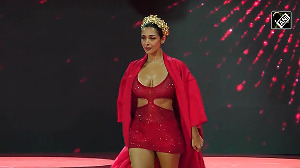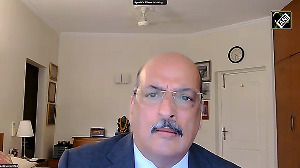In her strategy that is seen by political observers as one of the biggest attempts at social engineering in recent years, the BSP supremo shed her image as only a Dalit leader and aligned with upper castes, against whom her party had in the past carried out a consistent campaign.
Only rediff predicted: Mayawati will win over 184
Casting aside her 'anti-Manuvadi' stance, her pet theme against the upper castes, Mayawati ensured a substantial number of tickets to Brahmins and also others while keeping her Dalit vote-bank intact.
This was especially remarkable as it was the first election for the BSP after the death of party founder Kanshi Ram, who was instrumental in bringing the party to power in alliance with the Samawajwadi Party in 1993.
That experiment was significant in that Kanshi Ram, who was the architect of the BSP-SP tie-up, ensured defeat of an aggressive Bharatiya Janata Party one year after the demolition of the Babri Masjid.
The BSP, which earlier used to proclaim 'tilak, taraju aur talwar, maro unko jhoote char' (Beat up Brahmins, Vaishyas and Kshatriyas), changed the tune completely this time. The new slogan -- Haati nahin Ganesh hai... Brahma, Vishnu, Mahesh hai (It is not the elephant but Lord Ganesh, symbolising all gods and communities) -- caught the attention of the upper castes, a sizeable section of which seemed to have gone in her favour.
In fact, the gain for the BSP is in a way loss for the BJP, which had emerged as the champion of the upper castes in the post-Mandal, Mandir phase. Incidentally, the BJP has been using social engineering effectively in the last two decades which had seen its rise from a mere two seats in the 1984 Lok Sabha election to power in 1998.
The BSP also posed problem for the Congress, which once rode the BMW (Brahmin, Muslim and Weaker sections) card in the state successfully for a long period till 1989.
Mayawati proved her detractors wrong who felt that she would not be able to transfer her Dalit votes to non-Dalit candidates in substantial numbers and that her strategy was a doomed one.
According to a prominent BSP leader, there are several factors that worked in the party's favour, including the disillusionment of the people towards the Samajwadi Party establishment and the record of its governance.
The Election Commission's firmness in ensuring a free and fair election also helped the BSP as its detractors were unable to influence the voters through muscle power, the BSP leader said.
Also helpful for the BSP was the relatively low turnout as its vote-bank is known for being prompt in exercising their franchise.
The outcome in UP is also worrisome for the national parties as the BSP supremo has not shied away from declaring that her eyes are set on Delhi.
Mayawati's strategy in UP from day one of not having any pre-poll alliances also projected the BSP as a serious player out to play the game with a killer instinct. The die is cast.





